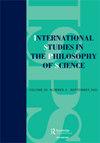论关键自然资本的概念与保护
IF 0.8
2区 哲学
Q2 HISTORY & PHILOSOPHY OF SCIENCE
International Studies in the Philosophy of Science
Pub Date : 2019-10-02
DOI:10.1080/02698595.2020.1788347
引用次数: 4
摘要
摘要生态经济学是一门跨学科的科学,主要关注制定干预措施,以实现可持续的生态和经济系统。尽管生态经济学家在过去几十年中取得了各种实证、理论和概念上的进步,但有一个概念仍然存在困惑:关键自然资本。虽然关键自然资本指的是环境中对我们物种的持续生存至关重要的部分,但通常与这一概念相关的术语的含义,如“不可替代的”和“不可能替代的”,需要比它们通常接受的更清晰的表述。借助方程和图表,本文对临界自然资本进行了新的明确解释,明确了客观环境条件对持续存在的必要性。本文的第二个主要部分转向对保护关键自然资本的优先顺序进行正式建模的问题。尽管一些生态经济学家认为,超过一定阈值,临界自然资本具有绝对无限价值,但绝对无限效用模型遇到了重大问题。本文表明,相对无限效用模型提供了一种更好的方法来建模保护关键自然资本的优先级。本文章由计算机程序翻译,如有差异,请以英文原文为准。
On the Concept and Conservation of Critical Natural Capital
ABSTRACT Ecological economics is an interdisciplinary science that is primarily concerned with developing interventions to achieve sustainable ecological and economic systems. While ecological economists have, over the last few decades, made various empirical, theoretical, and conceptual advancements, there is one concept in particular that remains subject to confusion: critical natural capital. While critical natural capital denotes parts of the environment that are essential for the continued existence of our species, the meaning of terms commonly associated with this concept, such as ‘non-substitutable’ and ‘impossible to substitute,’ require a clearer formulation then they tend to receive. With the help of equations and graphs, this article develops new definite account of critical natural capital that makes explicit what it means for objective environmental conditions to be essential for continued existence. The second main part of this article turns to the question of formally modelling the priority of conserving critical natural capital. While some ecological economists have maintained that, beyond a certain threshold, critical natural capital possesses absolute infinite value, absolute infinite utility models encounter significant problems. This article shows that a relative infinite utility model provides a better way to model the priority of conserving critical natural capital.
求助全文
通过发布文献求助,成功后即可免费获取论文全文。
去求助
来源期刊

International Studies in the Philosophy of Science
HISTORY & PHILOSOPHY OF SCIENCE-
自引率
12.50%
发文量
10
期刊介绍:
International Studies in the Philosophy of Science is a scholarly journal dedicated to publishing original research in philosophy of science and in philosophically informed history and sociology of science. Its scope includes the foundations and methodology of the natural, social, and human sciences, philosophical implications of particular scientific theories, and broader philosophical reflection on science. The editors invite contributions not only from philosophers, historians, and sociologists of science, but also from researchers in the sciences. The journal publishes articles from a wide variety of countries and philosophical traditions.
 求助内容:
求助内容: 应助结果提醒方式:
应助结果提醒方式:


